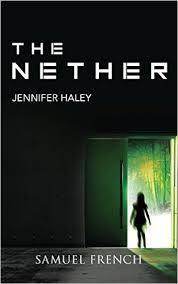A Haunting ‘Nether’ World at Woolly
By • April 27, 2016 0 1225

Whatever your level of digital competency, I’m sure you’ve stopped and wondered exactly what kind of superhighway we’re collectively traveling on, and where the latest app is taking us on the never-ending treadmill known as the internet.
How private is our private life? Who’s communicating with us in the disembodied replies to our queries? Who’s watching and recording our every peck on a keyboard, click on a mouse, touch on a screen?
“The Nether,” a remarkable play by Jennifer Haley — and an amazing piece of stagecraft that’s at once gripping, really smart, imaginative, dramatically disturbing, even poetic and, yes, more than a little creepy — tackles just about any question you might have about our rapidly changing technological capacities, which allow us to confront and evade reality at an alarmingly accelerating rate.
Directed by Shana Cooper with a gifted cast headed by Washington veteran Edward Gero, “The Nether” is getting a dazzling production at Woolly Mammoth through May 1. The play can work as a detective thriller about unraveling identity, asking what is a crime in our brave new world, or as a dystopian sci-fi story. It could even be mistaken for an extended and lavishly decorated episode of Special Victims Unit, the long-running NBC cop show that specializes in sex crimes.
The play imagines a world — it could be decades away, or a month — in which the internet, where people already spend an inordinate amount of their professional, personal, imaginative and breathing time — has expanded to become the Nether, a digital space where virtual reality is as common as waking up and going to sleep.
In this world, a man named Sims is under investigation by Nether police for creating a difficult-to-hack sub-world called the Hideaway — subscription-only, apparently — where customers can spend time in a detailed recreation of a Victorian environment, geared toward an aesthetic of finely honed visual and intellectual beauty. This historical-artistic setting is a way of glossing over its real purpose: to enable users to spend time with, have sex with and do horrific violence to an avatar of a little girl. It is, in other words, as one observer commented, a daydream for pedophiles.
That notion is always there, underlying (and sometimes undermining) the plot, debates and twists and turns of the play. Sims, the creator and virtual ringmaster of the Hideaway, played with insistent evasiveness by Gero, is being interrogated by a police officer, bluntly portrayed by Gabriela Fernandez-Coffey. He does intellectual battle with his tormentor, rationalizing, using the privacy defense, above all trying to evade responsibility.
Sims — also known as Poppa in the Hideaway — puts forward an old argument: wouldn’t it be better for people to be allowed to commit virtual or fantasy crimes in the Hideaway than act out in the real world?
In the Hideaway, visitors adopt other identities. The star object of desire — for Poppa, for a youngish swain, for customers — is Iris, a virtual little girl who is at once precocious, intelligent, smart, funny and appealing, deftly played by 18-year-old Maya Brettell.
It should be noted that the entire enterprise seems virtual. The more odious implications of the Hideaway are handled with discretion and imagination. There are no graphic depictions of sexuality or violence. What’s haunting is the talk about the future of the virtual world and the internet and how we live in it, outside of it or even deeply lost in it — as one character appears to be, to the point of becoming a permanent resident or “shadow.” It’s talk, sharply written and argued, that’s already being bantered around coffee tables and chat rooms, sometimes erupting from dreams.
One of the ideas embedded in the play is that the world has denuded itself of reality. The steadily eroding environment, the disappearing plants and animals, the machines that do everything that brains and muscles should do, have made it difficult — in this world — to keep it real. This has created a niche for places like the Nether, places where anything that can be imagined, dreamed or desired can be fulfilled, made real or achieved.
“The Nether” — which in its staging seems feverishly detailed — may be in the end neither here nor there, but some of it (perhaps most if it) is coming up, straight ahead.
Click.

